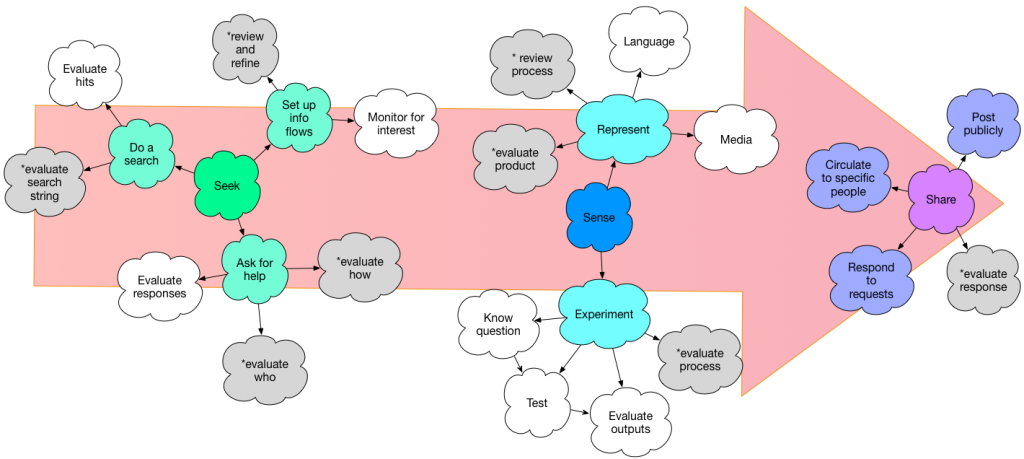I’ve been thinking a lot about processing in learning of late; what processing matters, when, and why. I thought I’d share my thinking with you and see what you think. This is my processing! :)
We know processing is useful. You can consider Craik & Lockhart’s Levels of Processing model, or look to the importance of retrieval practice as highlighted in Brown, Roediger, and McDaniel’s Make it Stick. The point is that retrieving information from memory and doing things with it increases the likelihood of learning. One of the questions is “what sort of retrieval (or processing)?”
I’ve always advocated for applying the information, doing something with it. But there are actually a variety of useful things we can do:
- representing information (a form of reflection) whether rewriting, or mindmapping, or…
- connecting to other known information, personal or professional
- considering how it would be applied in practice
- applying it in practice, real or simulated
Of course, we want there to be scrutiny and feedback for the learning to be optimized, etc.
Now, this is in the individual instance, but I’m also looking at the sequence of processing. What would be a series of activities that would develop understanding. So, for instance, for a problem-solving practice like trouble-shooting a process, what might you do? You might have (say, after a model of the process, and examples) a sequence of :
- critique someone else’s performance
- try a simple example of performing
- try a more complex example (perhaps in a group)
- …(more examples of performing)
- try a very complex (read: typical) example
We could throw in related tasks as well either during or as a summary:
- create a checklist to follow
- draw a flow diagram
- create a representation
On a more categorical task, say determining whether a situation qualifies as this or not (with shades of grey in between), we would have a similar structure, but with different types of tasks (again, after initial content such as definition and examples):
- review a case where it clearly is (white)
- review a case where it clearly isn’t (black)
- group review a case of grey (but not too bad)
- group review a case of grey (more shady)
- …
Again, we could have interim or summary tasks:
- summarize the constraints
- document a proposed process
- make a plan for how to do it in the future
- …
What I’ve explicitly added here is when and why to go ‘social‘. There are benefits for the same, but should they all be social? I’ll argue that there’s some initial prep that’s individual, to get everyone on the same page. Since all are different, it helps if this is individual. Then there’s often value in doing it socially, for the reasons in the linked post. Then, I reckon there’s value in doing something independently, to consolidate the learning. And, of course, to determine what capability the individual has acquired.
The point I want to make is that the processing flow, the progression from activity to activity, matters. We want to introduce, diverge, and then converge. We do need to elaborate across contexts to support transfer, and of course increase complexity until they’ve developed the ability to deal with the typical difficulty of cases.
I’m thinking that, too often, we forget the consolidation phase. And we’re often doing processing that’s somewhat like what we need them to do, but ultimately tangential. There are multiple constraints here to be acknowledged, cognitive such as depth and breadth as well as pragmatic such as cost and time, but we want to find the right intersection.
And my practical question is: where does this fall apart? Are their situations where this doesn’t make sense? I realize there are other types of outcomes that I haven’t represented (I’m being indicative, not exhaustive ;), but is this a useful way to think about it?

